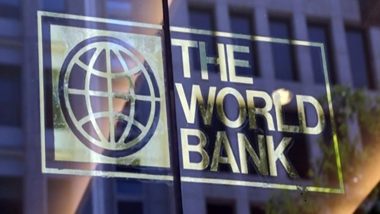Islamabad, April 16: The World Bank has estimated a drop in GDP per capita income for Pakistan from USD 1,613.8 in 2021-22 to USD 1,399.1 in 2022-23, Business Recorder reported.
In its report 'Macro Poverty Outlook for Pakistan: April 2023', the bank noted that GDP per capita growth is estimated at -1.5 per cent in 2022-23 in comparison to 4.2 per cent in 2021-22. World Bank has cut Pakistan's GDP forecast to 0.4 per cent.
The unemployment rate in Pakistan is estimated to rise from 10.2 per cent in 2022-23 to 10.1 per cent in 2021-22. Poverty will inevitably rise with pressures from weak labour markets and high inflation, as per the Business Recorder report. Petrol Price Hike in Pakistan: Rate of Petrol Increased by Rs 10 Per Litre by Cash-Starpped Country.
In the absence of higher social spending, the lower-middle-income poverty rate is expected to rise to 37.2 per cent in FY23. Considering poor households' dependency on agriculture and small-scale manufacturing and construction activity, they remain vulnerable to economic and climate shocks.
Gross investment is estimated to reduce to 106 per cent in 2022-23 compared to 13.3 per cent in 2021-22. Gross Investment-Public is estimated to reach 2.8 per cent in 2022-23 in comparison to 3.4 per cent in 2021-22, Business Recorder reported.
Meanwhile, Private Consumption growth is estimated at 1.3 per cent in 2022-23 in comparison to 10 per cent in 2021-22. The World Bank has estimated that the revenue of Pakistan will drop to 10.9 per cent of GDP in 2022-23 in comparison to 12.1 per cent in 2021-22, as per the Business Recorder report.
According to the World Bank, Pakistan's economy is under stress with low foreign reserves and high inflation. The activity has reduced with policy restrictions, flood effects, import controls, high borrowing, fuel costs, low confidence and and political uncertainty. As per the report, the growth is expected to remain below potential in the medium term despite some projected recovery.
Meanwhile, the World Bank has warned that Pakistan's inflation is projected to further rise to 29.5 per cent in the fiscal year 2023 due to higher energy and food prices and the weaker Rupee, Dawn reported. However, the World Bank report on the macro poverty outlook for Pakistan said inflation was expected to moderate over the forecast horizon as global inflationary pressures dissipated.
The World Bank said agricultural output was also expected to contract for the "first time in more than 20 years" due to last year's catastrophic floods, as per the Dawn report. "Industry output is also expected to shrink with supply chain disruptions, weakened confidence and higher borrowing costs and fuel prices. Mufti Abdul Shakoor Dies in Accident: Pakistan's Religious Affairs Minister Dead After Vehicle Hits His Car in Islamabad (Watch Video).
The lower activity is expected to spill over to the wholesale and transportation services sectors, weighing on services output growth," the report read. With dampened imports, the current account deficit in Pakistan is projected to narrow to 2 per cent of GDP in the fiscal year 2023 but widen to 2.2 per cent of GDP in the fiscal year 2025 as import controls ease.
(The above story is verified and authored by ANI staff, ANI is South Asia's leading multimedia news agency with over 100 bureaus in India, South Asia and across the globe. ANI brings the latest news on Politics and Current Affairs in India & around the World, Sports, Health, Fitness, Entertainment, & News. The views appearing in the above post do not reflect the opinions of LatestLY)













 Quickly
Quickly


